by Mayumi-H | Jul 28, 2012 | Process
With apologies to The Killers.
The history of human communication is an interesting one, from an anthropological perspective. The idea that people told each other stories – to stave off the demons in the dark (or to bring them to life), to explain their visions in the sky, to keep close the triumphs and tragedies of their brethren – has always been lovely to me. I think it’s one of the main reasons why I first tried putting pen to paper, to preserve the ideas in my head, to answer the questions I wanted answered: Who are we? Why do we do the things we do? What hopes exist for us, out there in the vast wilderness?
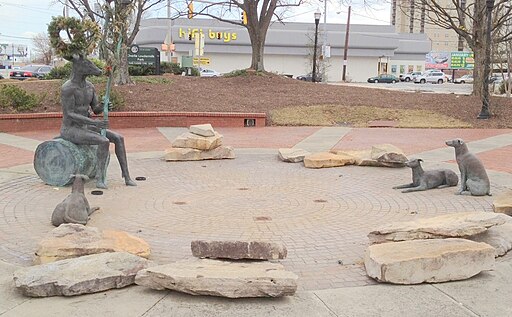
Photo by Keizers, via Wikimedia Commons
Stories aren’t just about creating characters or putting plots into motion. They’re ways to examine the world around us. Which is why it saddens me to think there are writers, directors, editors, artists out there worried only about the next big thing, ways to capitalize upon the latest trend. People unconcerned about the story,when it’s the story that moves people.
Katniss Everdeen isn’t just a kick-ass fighter; she’s got a story. Batman isn’t just a gritty super-detective; he’s got a story. Henry Jekyll, James T. Kirk, Frodo Baggins, Spike Spiegel: what makes these characters great – frightening, masterful, inspiring, entertaining – is not just what they are but the role they fulfill within the greater story. Without Primrose, who is Katniss? Without his rogues’ gallery, who is Batman? That’s what engages readers and followers: the story around those characters and their world.
I tell stories I want to tell. It’s one of the reasons I’m so horrible at collaboration, I suppose. But the storyteller needs to create worlds that interest him. She needs to (try to) answer those questions weighing on her mind. He needs to fall in love – at least a little bit – with his story. We can put the manuscripts away when they’re done, but I think we’ve got to pay attention to more than just the cookie cutter basics that have been made popular.
Do you agree? When it comes to your latest/current work, what is it about it that drives you to tell that story?
by Mayumi-H | Jul 21, 2012 | Uncategorized
Back when I was writing fan stories, I was very concerned about hit statistics. I would check my hit meters every day, and, if I didn’t match my numbers from the day prior, I’d get a little depressed, or I’d worry about why I was “losing readers.” Was I not making them happy? Were they bored with my story? What had I done wrong? I’d wring my hands over this nonsense, even though – rationally – I knew the numbers meant nothing. I could get 150 hits in a day…but it’s not like anyone would ever leave me any feedback, which was what I really wanted.
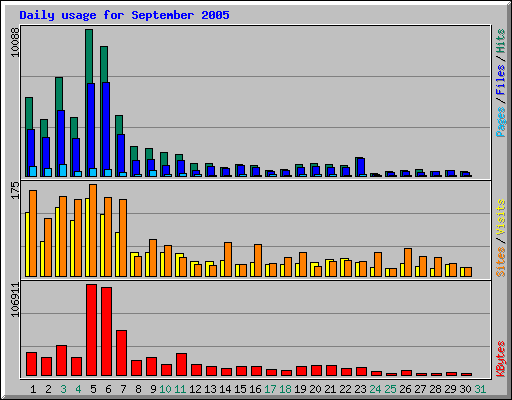
A typical hit stats graph
I still check my hit statistics on posts and stories, but I’ve become so much less affected by them. If a story or post goes days without garnering any interest, I feel a little sad, mostly because I think of my stories as part of myself. And I don’t particularly enjoy feeling neglected. But then I’ll look at another piece that gets a lot of hits, but very little feedback, and I’ll be reminded that it’s not the numbers that make me feel fulfilled.
It’s not important how many people glance through a post or a story. What’s important to me is when I’ve made someone laugh, or cry, or reflect a little on their own lives, with my words. And if they take a moment to let me know that my story affected them in some way? That’s one of the best feelings in the world. I’d much rather have one person be genuinely touched by my story, than a hundred or even a thousand who just take a glance and feel nothing.
Some people will tell you that hits are valuable: essentially, they’re a measure of your success. Others will tell you that hits mean nothing. I’m here to tell you that – in my experience, at least – hits can represent popularity and how successful you are with reaching your audience…but they truly don’t matter, so long as you love what you’re doing.
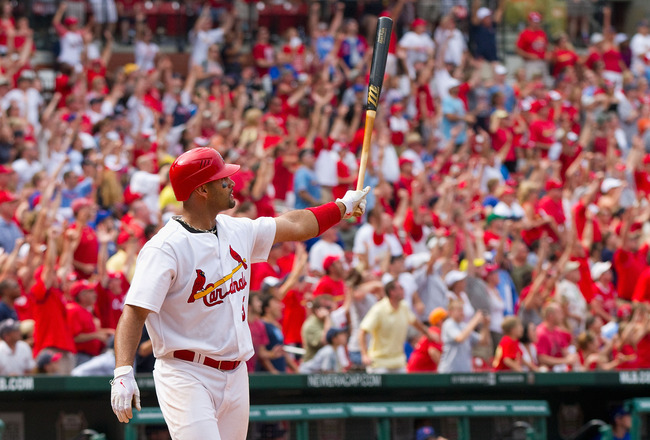
Which would you rather: get the hits, or love what you do?
What are your feelings on hit statistics?
by Mayumi-H | Jul 7, 2012 | Process
I recently had a reader get in touch with me, about one of my older stories. This person told me the site was removing some stories, and I should back mine up to another source, if I hadn’t done so already. I know the intent was conscientious and concerned…but I was a little offended by that, at first.
I haven’t come so far as a writer, not to know to back my s–t up! That was one of the earliest (hard) lessons I ever learned: losing a story I’d been working on because I had only one copy, and that copy was gone forever when the binder in which it resided was stolen. (Actually, my whole bag was stolen, along with a $125 textbook…but it was the loss of that story I mourned the most.)
Since that time, I’ve always kept backups of my work. In fact, these days, I keep two, three, sometimes even four working backups!
I work mostly on computer (when I do work in longhand, I transcribe during my downtime). I’ve got two of them: one that sits at my writing place at home, and one that’s used mostly for my day job, but that I write with during my commute. Every morning, the working draft (and scrap documents) get uploaded to my server from my home machine. Those are downloaded to my work machine, for the work day. When I’m about to leave work, I upload the latest documents to the server again; if I work on the story during the commute home, the documents simply get uploaded again. Then, once I’m home, I download those documents to my home computer, where I’ll work some more. In between this schedule, I backup all of my documents – both the working ones and the support ones (research, interviews, character sketches, floorplans, clothes pictures, et alia) – to my flash drive about every week or two. And, if that’s not enough, I do regular backups of several of my folders to another large portable hard drive that sits on my desk.
I can’t 100% guarantee I’ll always be able to have the latest version of my ms at my fingertips…but I won’t risk losing days’ or weeks’ or even months’ worth of progress. Not on something so important to me.
What is your backup routine? (And don’t dare tell me you don’t have one! Backups are cheap!)
by Mayumi-H | Jun 30, 2012 | Fearless, Process
Perhaps that title is a bit misleading….
I recently started preliminary planning for a documentary project, and, as I did, I got to thinking about why I like to do what I like to do when it comes to video production. I’ve spent a good portion of my professional (job) life working with video, and much of that has to do with production. But, while I once fancied myself an actor, I’ve come to enjoy being behind the scenes more than being in front of a camera. Video production involves many steps, and many skills, but the one which I favor most doesn’t happen in production, at all. It happens in post-production: editing.
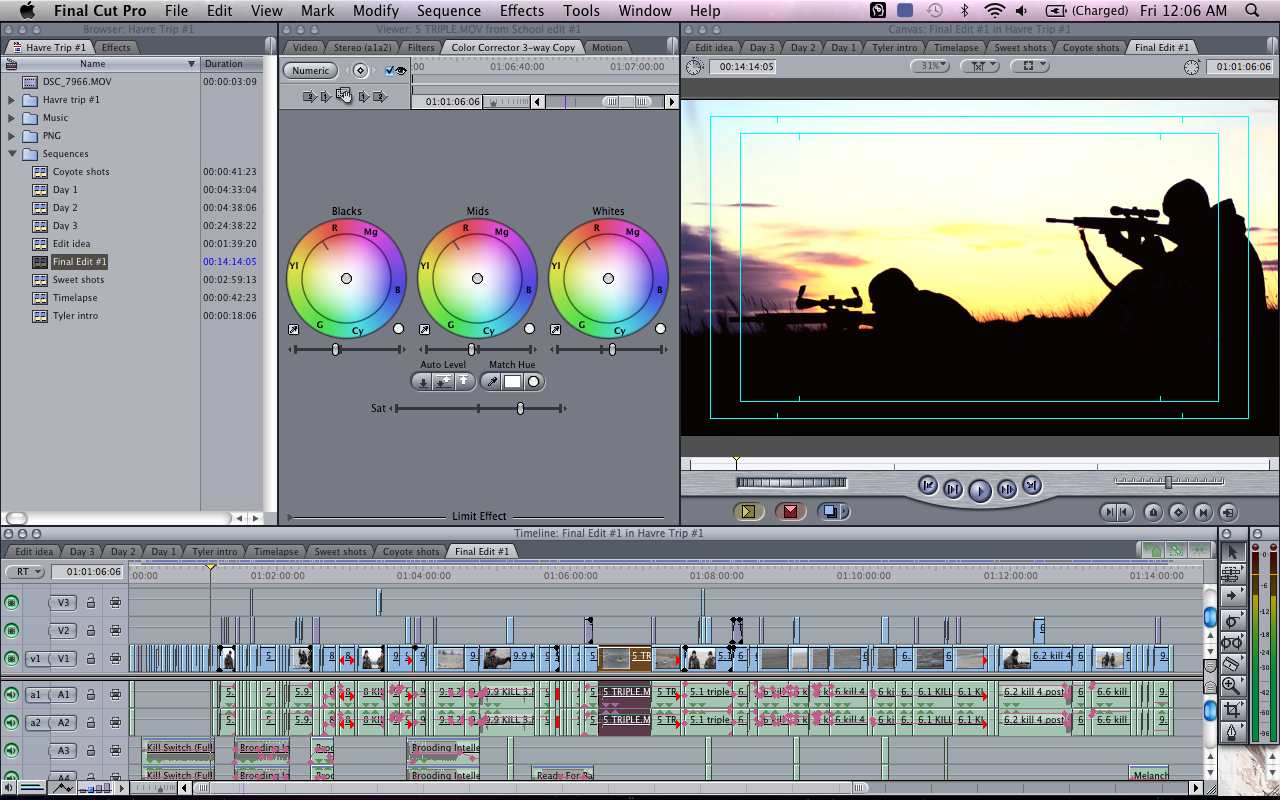
This is kind of my life.
I’ve edited lots of projects in my time: some small, some not. What I think I love most about that process, though, is that I get to be the one telling the story.
If you think about it, the editor has final input into how the story – especially one in video – plays out. We control the angles, the cuts, the music – all of the details, conscious and subliminal. And that controls how the audience views the characters, the conflict, and the outcome. A simple focus frame on a character’s face (whether they’re speaking or not) can give completely different meaning to a scene. That guy doing the intro for “The Outer Limits” was not kidding; we (editors, that is) control everything.
[youtube http://www.youtube.com/watch?v=8CtjhWhw2I8?rel=0&w=420&h=315]
It’s the same in writing, too, I think. The editor – whether that’s you doing your first edit or your professional editor doing the final one – controls what the reader sees, how they view the story. The editor doesn’t actively write any of the words of the story, though. Not in my experience, anyway. They help tell the story without writing the words, guiding the writer’s hand and vision with cuts, suggestions, and insight.
We video editors do the same thing. We’re given rough footage, where plot, point, characterization can go one of any number of ways. And, when we’re finished, assuming we’ve done our job right and well, the audience gets a story. Hopefully a good one. But marked by our hands, no matter that.
I’m excited to work with an editor for my first real novel. I’m scared, too; I’ve never put such a huge work – such a gigantic chunk of myself – out there for someone else to tear down. But I want to build a better story than I could do alone. I just hope I get an editor who’s as careful and conscientious as I try to be.
Have you worked with a professional editor before? Was it a good fit, or a not-so-good one? What did you learn from that process?
by Mayumi-H | Jun 4, 2012 | Fearless, Persona 4 Fan Fiction, Process
I read somewhere that it can be helpful to take a step back and just look at your work. Not from an artistic perspective or a storytelling or an editing one, but from a visual one. The idea is that, if every page looks the same (whether it’s big blocks of text or lots of lines of dialogue), you may need to switch up your storytelling style a bit. It’s just another subtle way of keeping your readers’ attention, I guess.
So, on a recent revision of my manuscript, that’s what I did. I took a step back, and looked at the first page and a half of a chapter.
I have to point out, here, that the reason I did this was because I was leery about starting another chapter with a lot of textual explanation, as I’d done the last chapter. Anyway, here’s what the initial draft looked like:
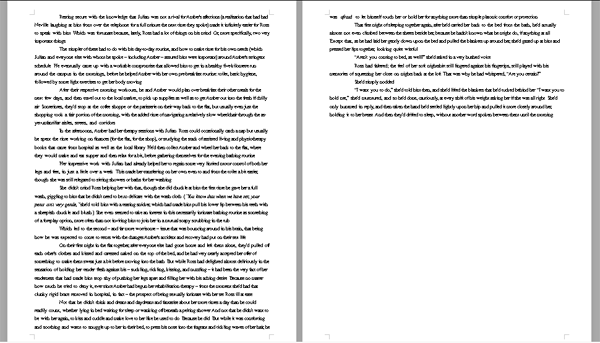
The original start to Chapter 15.
Whoa. What a wall of text. It’s necessary text, though. There’s a fair amount of explanation that happens, to set up the minor conflict of this chapter. But there’s already a lot of description and setup that happens in the surrounding chapters, and I didn’t want to subject the reader to having to read these huge intros every time.
So, here’s the second draft:
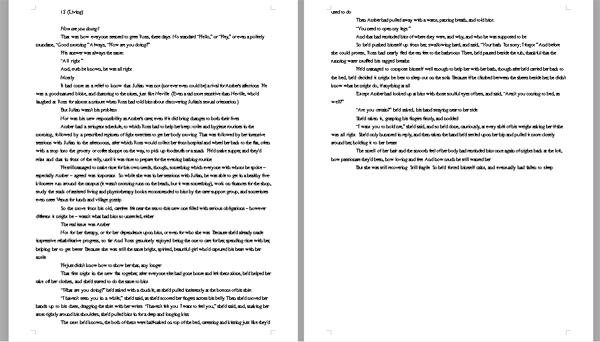
The revised Chapter 15 start. Looks nicer, yes?
All I did differently was break up the blocks of description and explanation with some more personal insight from my main character, answering questions from other people. The same information is offered, but it’s broken up into what I consider more manageable pieces.
And, doesn’t it look a little nicer to read, too?
I’m not afraid to read lush description, but sometimes you just need to change it up, for sake of your reader’s eyes. What about you? Would that wall of text have scared you off? Do you find it helpful to look at your stories in a visual way?







Recent Comments